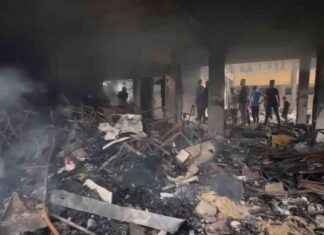It took a few hours on social networks before an avalanche of political reactions swept in. A campaign celebrating diversity and “freedom in the hijab” launched by the Council of Europe triggered strong criticism in France on Tuesday, November 2, leading the organization, human rights watchdog on the continent, to withdraw it the same evening.
The Council of Europe campaign, which asks: “How boring would the world be if everyone would look the same? “(“Wouldn’t the world be boring if everyone looked the same? “) COUNCIL OF EUROPE
It is precisely the message in English, accompanying the portraits of several young women veiled on only one half of the face, affirming “beauty is in diversity as freedom is in hijab” (“beauty is in diversity as freedom is in the hijab”), which is at the origin of the reactions of personalities both on the extreme right and on the left of the French political field and the intervention of the government.
France had “expressed its extremely strong disapproval”
Broadcast since Thursday, October 28, the campaign launched by the Council of Europe’s inclusion and anti–discrimination programme – a programme co-financed by the European Commission to the tune of 340,000 euros – had so far gone unnoticed.
In the government, it was the Secretary of State for youth, Sarah El Héry, who claimed, after the withdrawal of the post from the campaign by the Council of Europe on Tuesday evening on LCI, that France had “expressed its extremely strong disapproval”, allowing through “its diplomatic networks” precisely “the withdrawal of this campaign as early as [Tuesday]”.
????????? Controversial video of the European Council: “France has expressed its extremely strong disapproval, hence the ret… https://t.co/7T0LaUDgGf
— LCI (@LCI)
On Wednesday, it was the turn of the Minister of Foreign Affairs, Jean-Yves Le Drian, to criticize this campaign. “These tweets have nothing to do with the application of the principle of secularism in France,” he said during the government’s question time in the Senate. “There is a big difference between defending freedom of conscience, freedom of religion, between leading a determined fight against discrimination and, on the other hand, making an institution like the Council of Europe actively promote a particular religious sign or dress,” continued Mr Le Drian.
In the Republican Party (LR), the campaign generated strong reactions. Valérie Pécresse, candidate for the party’s nomination for the 2022 presidential election and president of the Ile-de-France region, expressed in a tweet her “stupor”, believing that the veil was “not a symbol of freedom but of submission”. One of his competitors for the nomination, the Alpes-Maritimes DEPUTY Eric Ciotti, denounced a “promotion of the Islamic veil” and a “negation of our Judeo-Christian roots”. The leader of the LR senators, Bruno Retailleau, meanwhile, believed that the Council of Europe was “openly promoting submission to Islamist mores”.
The campaign also provoked a reaction on the left, with socialist senator Laurence Rossignol – former minister for women’s rights and supporter of Arnaud Montebourg’s presidential candidacy – saying in a post: “It is one thing to remind women that they are free to wear the hijab (in compliance with the laws of each member State, in France that of 1905 and 2004). To say that freedom is in the hijab” is to “promote it”. Former prime minister and ex-member of the Socialist Party Manuel Valls, on the other hand, considered the anti-discrimination campaign “shocking, mind-boggling and dangerous”.
On the far right, it caused an outcry. Marine Le Pen, candidate of the Rassemblement national (RN), reacted with a tweet in the early afternoon: “This European communication in favor of the Islamist veil is outrageous and indecent. It is when women remove the veil that they become free, not the other way around! “For the sovereigntist deputy Nicolas Dupont-Aignan, who was also speaking on Twitter, “this is not a propaganda campaign of the Muslim Brotherhood but of the Council of Europe”. The polemicist Eric Zemmour, a likely presidential candidate, denounced an “advertising jihad” and claimed that “Islam is the enemy of freedom”.
The tweets “do not represent the position of the Council of Europe”
“These tweets have been removed and we will think about a better presentation of this project,” the Council of Europe, the pan-European organization based in Strasbourg, confirmed in a statement sent to Agence France-Presse. They “were part of a joint project” of the Council and the European Union “whose objective was to raise awareness of the need to respect diversity and inclusion and to combat all types of hate speech,” the Council of Europe justified. The tweets “reflected the statements made individually by participants in one of the project workshops and do not represent the position of the Council of Europe or its Secretary General [Marija Pejcinovic Buric],” the body further assured.
Although the Commission did contribute to the financing of the inclusion and anti-discrimination programme, it wished to have its spokesperson clarify at its daily press conference on Wednesday 3 November that the Council of Europe was “playing a leading role” and that it “had not validated the controversial elements”.
However, the Commission calls for the “other actions” of this programme against hate speech to be taken into consideration. “Our position is extremely clear: women should be able to wear whatever they want, according to the laws of the country where they live,” insisted a second spokesman for the institution.
The contribution space is reserved for subscribers. Subscribe to access this space and contribute to the discussion. Subscribe Already subscribed? Log in
Contribute
Share Share disabled Share disabled share Disabled Send by e-mail Share disabled share disabled share Disabled share Disabled








